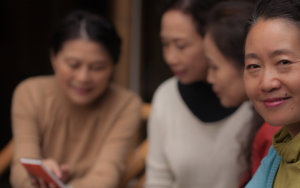It is easy to make money the focus of your retirement planning. Having your financial plans in place well in advance gives you a good understanding of the kind of lifestyle you can afford.
But money is just one aspect of stepping away from work. Retirement is about more than money. With good planning, your finances will hopefully be the least of your worries. As you get closer to hanging up your hi-vis, laptop or calculator for the last time, it’s worth thinking about the way you’re going to spend your time.
We’ve put together a few pointers to help get you started.
1. Who will be around?
Your vision of retirement might include anything from cycling to meet friends for coffee to spending every afternoon playing golf to sitting on the couch, catching up on your favourite Netflix shows while you learn to knit -all great past-times.
However, will your friends and relatives be available to join you? This is particularly important to think about if you are retiring before your spouse, or are one of the early retirees in your friendship group.
The reverse is also true. Your spouse might already have retired, or retire at the same time as you, and have a completely different idea of what you’ll do together. Make sure you talk to them about what they expect for your retirement together.
Also consider what other family members expect or hope your retirement will look like, especially as it relates to them. Talk to your children and other close relatives to set some boundaries about what you want for your retirement.

2. What are you going to do?
After a lifetime of working, the idea of sleeping in every day for the rest of your life can sound like bliss. Maybe you haven’t planned anything beyond “doing nothing”.
Doing nothing is actually a great way to spend time. You reap the rewards of a working life without guilt. Enjoy feeling the pressures of work lifting from your shoulders, savour the quiet of home, and rest.
Please believe us, though, that you’re likely to become a bit antsy after a while, rattling around with no purpose.
Before you retire, why not make a list of everything you would like to do and things you used to enjoy that you might get back to? Include big and small things. Want to learn to abseil? Put it down. Dining room need repainting? Add it to the list. Used to love camping? Scribble it down. Hoping to spend more time helping out with your local neighbourhood cricket team? Write it on there.
Don’t judge your list or put pressure on yourself to get everything done. It’s only a list of suggestions that you’re making for yourself in case you get stuck. You can add new things as they take your fancy and cross things off if you change your mind.
Set yourself a timeframe to stop ‘doing nothing’. When that deadline approaches, you can decide if you’re ready to leap into a new activity (or an old one!), and if you are, you’ve got a whole list of options to choose from right there at your fingertips. If you want a bit more ‘doing nothing’, reset your timeframe and check in again with yourself then.

3. Staying healthy
Everyone’s health is as unique as they are. Some people enjoy good health with no extra effort on their part; others can’t seem to catch a break.
Whatever your health is like now, make sure you factor your physical wellbeing as part of your life in retirement.
We’re not suggesting you start training for your first marathon (although, of course, if you want to, go for it!) but put some thought into your health. Health can include movement and exercise, eating well and seeking professional medical support and having health checks when they’re due.
It’s an old adage, but it’s true – all the money in the world can’t buy good health. Invest some effort into looking after your health.

4. And finally, what if you don’t want to retire?
Almost half of all Australians stop working because they have access to their superannuation or a pension. Not because they necessarily have a burning desire to stop.
If you like your work and enjoy the structure and social elements it provides you, or if you take your identity from what you do, the idea of walking away from that can be confronting and uncomfortable. Who will you be without your job? How will you cope without the structure or social contact? They’re real concerns and shouldn’t be diminished.
If this is you, recognise and acknowledge it. Consider what aspects of work you will miss most: Structure, socialising, mentoring younger staff, starting and finishing projects, being known as a “liney/accountant/storeman/etc”, or something else?
Think about what you can do in your new retired life that will provide you with the aspects you’ll miss.
If you enjoy mentoring and like the structure of work, for example, you could join the local volleyball team, where you can chat to the other players and provide them with the benefit of your life experience as you get to know them, as well as you enjoying the regularity of playing twice a week in a league fixture and meeting with your team to train once a week.
The solutions to your concerns are as individual as you are. It’s worth spending some time considering what it is you’ll miss about work and what you can do to address those things. Remember too, that if your first “solution” doesn’t work, you can rethink and try something else.
In addition to these concerns, many people are concerned about giving up the certainty of a regular wage to their bank account each fortnight. If that’s you, make an appointment to talk with us about the financial side of your retirement any time you like. We can help explain how super could work in retirement, including the different ways it can be converted into an ongoing income. Make a time to talk to us now to put your mind at ease.
Now get out there!
Having a good understanding of your finances is only one aspect of retirement. Give the social, physical, mental and emotional aspects of your life some thought and get out there and enjoy your new life!
See our Preparing for Retirement Booklet for further tips. Or check out our Retirement Hub page, full of links to useful pages and sites.


